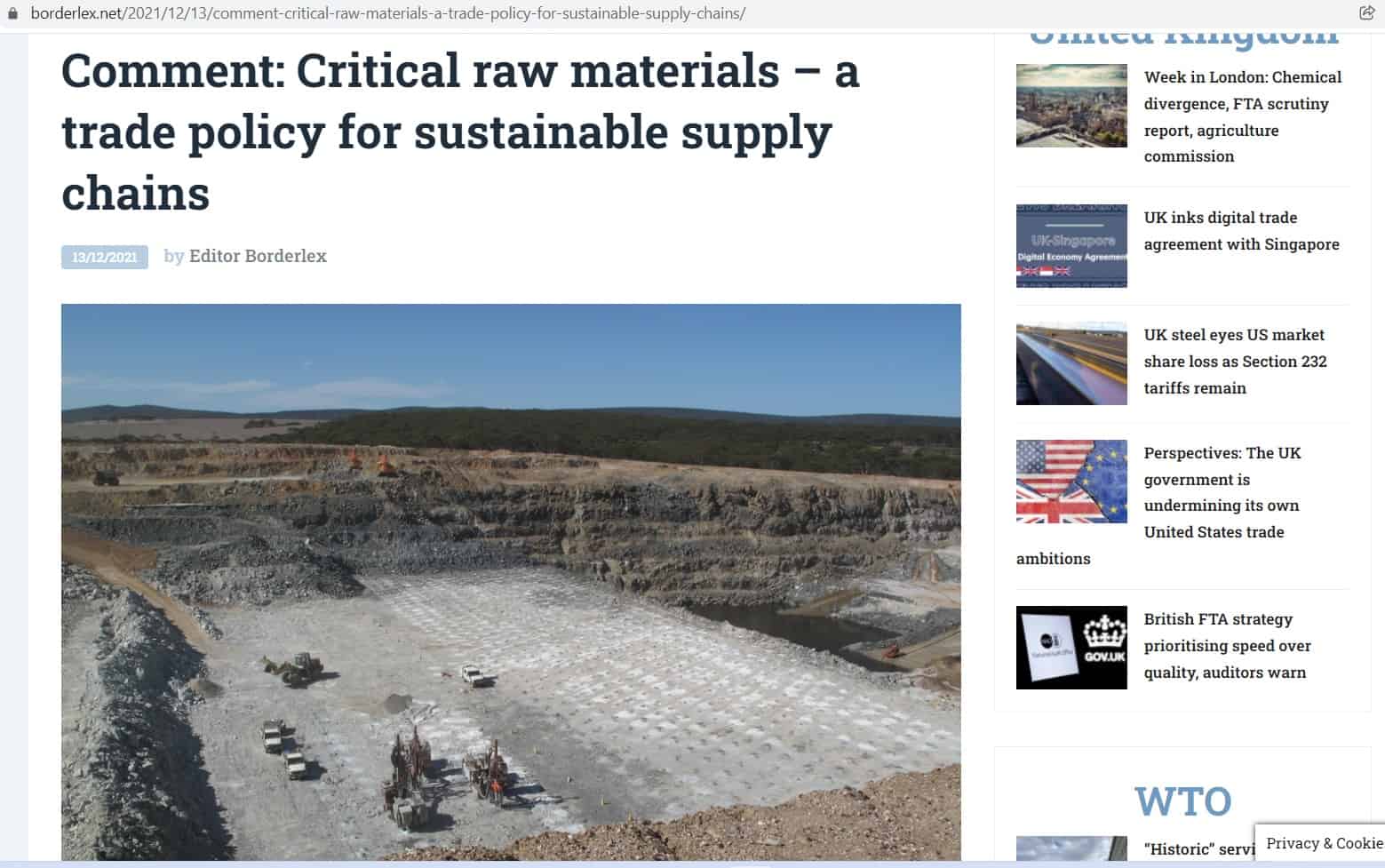In a guest contribution for Borderlex, four Members of the European Parliament call for a trade policy that is better adapted to the European Union’s new Critical Raw Materials strategy as it rolls out its Fit-for-55 climate package. Concluding outstanding free trade agreements with Chile and Australia is seen as part of the solution.
One of the main lessons of the COVID-19 pandemic is that over-reliance on a small number of external suppliers can render the European Union extremely vulnerable to disruptions or opportunistic practices. Strategic dependencies can be exploited for political goals, and in moments of crisis, this can carry significant risks.
With the European Parliament’s report on critical raw materials, we send a clear political signal that trade is part of the solution for tackling the numerous challenges of the 21st century.
Critical dependencies
The EU’s updated Industrial Strategy has shown that, the EU is highly dependent on external actors for certain vital raw materials.
The Commission’s Action Plan on Critical Raw Materials, identified key supply risks for the renewables sector or for e-mobility, particularly as it comes to rare earths and magnesium or germanium, among others. CRMs are fundamental for wind technology and for traction motors.
Strategic foresight exercises have moreover shown that by 2050, the EU will require 56 times more lithium than today and around 14 times more cobalt.
These realities simply cannot be ignored.
The successful post-crisis relaunching of the EU’s economy is determined by the ability to deliver on the dual, green and digital transitions: but such external dependencies are becoming strategic vulnerabilities. The European Parliament’s strategy for critical raw materials makes proposals to tackle these early on, showcasing the essential role of industrial, as well as of trade and investment policy.
When it comes to industry, boosting competitiveness in the context of the green transformation is a clear priority. We are already debating in the European Parliament the proposals included in the Fit-for-55 Package, intended to facilitate the EU’s carbon emissions reduction targets for 2030.
Policy initiatives on this front must consider comprehensive impact assessments that will ensure that feasibility is safeguarded. The competitiveness of our industry and capacity to innovate sustainably are vital looking ahead; nowhere is this more pertinent than for European small and medium-sized entreprises – SMEs – which are engines for economic growth and job creation.
The Fit-for-55 package involves to a great extent reliance on supplies of critical raw materials: rushing for the sake of speed can be detrimental. We should thus rather apply a ‘festina lente’ approach, insisting on a proper impact assessment of the combined effects of the proposed regulations. Current energy price increases and volatility are not going away by themselves, certainly not anytime soon. Individual consumers, especially the vulnerable ones, need protection and affordability.
Replacing certain sources of energy for industrial actors entails the availability of viable and stable alternatives. Resilient supply chains of CRMs are crucial in the construction of the necessary infrastructure for these alternative sources. This entails that efforts to diversify energy sources must go hand-in-hand with coordinated action to secure the supply of critical raw materials, ensuring that the required demand will be met.
We therefore will continue to advocate for those actions that will provide our critical supply chains with more stability and predictability.
Trade agreements help diversify critical raw materials
Trade and investment have a key role in boosting the resilience of European supply chains. The diversification of suppliers must be a core effort for all sound strategic planners that want to avoid temporary disruptions and costly last-minute alternatives.
Trade agreements in themselves are essential in facilitating a stable inflow of critical supplies.
The European Parliament’s report of the CRMs is rightly asking for deepening and expanding the EU’s rules-based engagement with commercial partners across the globe.
Countries such as Chile or Australia, to name but two, are important suppliers of critical raw materials – and thus we strongly urge for substantial progress in negotiations and the completion of the ratification processes as soon as the necessary conditions are present.
Trade cannot be expected to be a universal solution for matters related to sustainable development; nonetheless, its role in tackling supply chain instabilities cannot be understated.
In this international game of dependencies, where over-reliance is instrumentalised and weaponised by coercive foreign actors, the EU must consolidate its position. Indeed, the best course of action is the consolidation of the EU’s Open Strategic Autonomy goals as set out in its February 2020 Trade Policy Review.
The objectives of the green and digital transitions cannot be met without a stable supply of critical raw materials. There is a world of opportunities linked to the twin engines for growth, both in terms of global impact and in terms of job-creation, innovation, and economic benefits.
Signatories:
Anna-Michelle Asimakopoulou, Vice-Chair, International Trade Committee, EPP shadow rapporteur on the EP’s Critical Raw Materials report
Christophe Hansen, Coordinator for trade at the European People’s Party
Massimiliano Salini, EPP shadow rapporteur on the Carbon Border Adjustment Mechanism
Iuliu Winkler, EPP, Vice-Chair of the European Parliament’s International Trade Committee
Source: https://borderlex.net/2021/12/13/comment-critical-raw-materials-a-trade-policy-for-sustainable-supply-chains/








